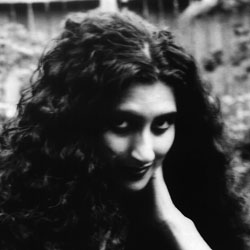Absolutely no angels in this death poem.
Half-baked poets offer angels for consolation
the way neighbours offer fruitcake at Christmas.
Absolutely no talk of Christmas in this death poem.
Resurrection went out with yesterday’s trash and
holy stars and wise men appear on hockey jerseys.
Absolutely no wise men in this death poem.
Wise men have never made dying understandable.
They’ve drawn no pie charts or graphs for the soul.
Absolutely no mention of souls in this death poem.
THe soul is not a ship, or a bird, or a flag, or a flower.
We have no power of attorney over it, no death connection.
Absolutely no mention of death in this death poem.
Angels are listening and the wise men are sketching.
Look at where all these souls are headed and tell no one.
Notes on the Poem
At first glance, Priscila Uppal's "No Angels in This Death Poem" seems breezy and irreverent. The poem seems to defy and mock the thought of death by taking it head-on in a form of address that is both sing-song and verging on sarcastic. On even closer examination, the regularity of the words, phrasing, verse structure and overall rhythm is almost like a chant. Is Uppal in fact invoking an incantation to maybe ward something off ... perhaps death? Uppal weaves a slender, steady thread of connections from one verse to the next, through repeated words and phrases ("Christmas" to "wise men" to "souls" to "death" itself). What is the effect of this sequence or thread of words? You could imagine it's an exercise of holding hands, both to link something together and to barricade something out ... perhaps death? The phrase "Absolutely no" at the beginning of each verse seems emphatic at first, but then each edict it issues is swiftly broken in the following lines of the poem. So, they are tough but ineffectual words, overly emphatic in the face of something feared. Uppal's poem ends up evoking many of the things disavowed or supposedly scorned earlier in the poem. In conclusion, the poem isn't as bold as it sets out to be, is it?
